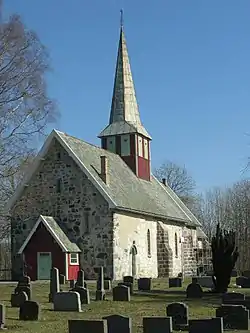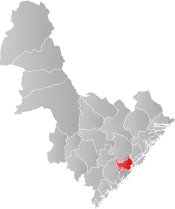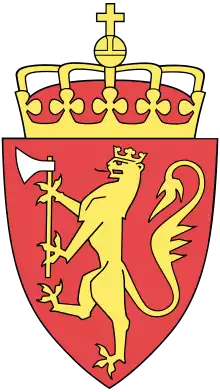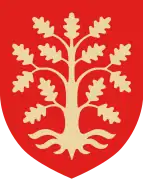Øyestad
Øyestad is a former municipality in the old Aust-Agder county in Norway. The 96-square-kilometre (37 sq mi) municipality existed from 1838 until 1992 when it was merged into the present-day municipality of Arendal which is now located in Agder county. At the time of its dissolution, the municipality of Øyestad encompassed most of the coastline between the towns of Grimstad and Arendal, along with the forested areas along the Nidelva river heading inland. Back in 1838, however, the municipality was far larger in size. The administrative centre was the village of Bjorbekk near the Bjorbekk Church.[1][2]
Øyestad kommune | |
|---|---|
 View of the historic Øyestad Church | |
 Aust-Agder within Norway | |
 Øyestad within Aust-Agder | |
| Coordinates: 58°24′43″N 08°38′55″E | |
| Country | Norway |
| County | Aust-Agder |
| District | Østre Agder |
| Established | 1 Jan 1838 |
| Disestablished | 1 Jan 1992 |
| Administrative centre | Bjorbekk |
| Area | |
| • Total | 96 km2 (37 sq mi) |
| *Area at municipal dissolution. | |
| Population (1992) | |
| • Total | 8,679 |
| • Density | 90/km2 (230/sq mi) |
| Time zone | UTC+01:00 (CET) |
| • Summer (DST) | UTC+02:00 (CEST) |
| ISO 3166 code | NO-0920 |
| Created as | Formannskapsdistrikt in 1838 |
| Succeeded by | Arendal in 1992 |
History
The parish of Øiestad was established as a municipality on 1 January 1838 (see formannskapsdistrikt law). In 1846, the southern district of Øiestad (population: 2,806) was split off to form the new municipality of Fjære. The municipality was again split in 1850 when the northern district of Øiestad (population: 1,976) was separated to become the municipality of Froland. After that, Øiestad had 5,215 inhabitants. On 1 January 1875, an area of the neighboring town of Arendal (population: 52) was transferred to Øyestad. Then on 1 January 1881, the island of Hisøya and its small, surrounding islands (population: 2,652) were separated to form the new municipality of Hisøy. This left Øiestad with a population of 4,474. In the early 1900s, the spelling of the name was changed to Øyestad. In 1936, an area of Øyestad (population: 33) was transferred to neighboring Austre Moland municipality.
During the 1960s, there were many municipal mergers across Norway due to the work of the Schei Committee. On 1 January 1962, the uninhabited area of Salvestjønn was transferred from Øyestad to the neighboring municipality of Landvik. On 1 January 1992, there was another large municipal merger. Øyestad (population: 8,679) was merged with the municipalities of Hisøy (population: 4,026), Tromøy (population: 4,711), Moland (population: 8,148), and the town of Arendal (population: 12,478) to form a new, much larger municipality of Arendal.[3][4]
Name
The municipality (originally the parish) is named after the old Øiestad farm (Old Norse: Øyjarsstaðir), since the first Øyestad Church was built there. The first element is the genitive case of the male name Øyjarr and the last element is staðir which means "homestead" or "farm".[5]
Coat of arms
The coat of arms was granted on 19 April 1985 and it was in use until the dissolution of the municipality on 1 January 1992. The arms are white and they show a wavy river flowing across them diagonally. The river represents the local river Nidelva that runs from the mountains into the fjord as it passes through the municipality. The river played an important role in the local economy.[6]
Government
All municipalities in Norway, including Øyestad, are responsible for primary education (through 10th grade), outpatient health services, senior citizen services, unemployment and other social services, zoning, economic development, and municipal roads. The municipality was governed by a municipal council of elected representatives, which in turn elected a mayor.[7]
Municipal council
The municipal council (Kommunestyre) of Øyestad was made up of 33 representatives that were elected to four year terms. The party breakdown of the final municipal council was as follows:
| Party Name (in Norwegian) | Number of representatives | |
|---|---|---|
| Labour Party (Arbeiderpartiet) | 15 | |
| Progress Party (Fremskrittspartiet) | 3 | |
| Conservative Party (Høyre) | 5 | |
| Christian Democratic Party (Kristelig Folkeparti) | 4 | |
| Centre Party (Senterpartiet) | 4 | |
| Joint list of the Liberal Party (Venstre) and Liberal People's Party (Liberale Folkepartiet) | 2 | |
| Total number of members: | 33 | |
| Party Name (in Norwegian) | Number of representatives | |
|---|---|---|
| Labour Party (Arbeiderpartiet) | 16 | |
| Progress Party (Fremskrittspartiet) | 2 | |
| Conservative Party (Høyre) | 6 | |
| Christian Democratic Party (Kristelig Folkeparti) | 4 | |
| Centre Party (Senterpartiet) | 4 | |
| Liberal Party (Venstre) | 1 | |
| Total number of members: | 33 | |
| Party Name (in Norwegian) | Number of representatives | |
|---|---|---|
| Labour Party (Arbeiderpartiet) | 15 | |
| Progress Party (Fremskrittspartiet) | 1 | |
| Conservative Party (Høyre) | 8 | |
| Christian Democratic Party (Kristelig Folkeparti) | 4 | |
| Centre Party (Senterpartiet) | 4 | |
| Liberal Party (Venstre) | 1 | |
| Total number of members: | 33 | |
| Party Name (in Norwegian) | Number of representatives | |
|---|---|---|
| Labour Party (Arbeiderpartiet) | 11 | |
| Conservative Party (Høyre) | 4 | |
| Christian Democratic Party (Kristelig Folkeparti) | 4 | |
| New People's Party (Nye Folkepartiet) | 1 | |
| Centre Party (Senterpartiet) | 5 | |
| Total number of members: | 25 | |
| Party Name (in Norwegian) | Number of representatives | |
|---|---|---|
| Labour Party (Arbeiderpartiet) | 12 | |
| Conservative Party (Høyre) | 1 | |
| Christian Democratic Party (Kristelig Folkeparti) | 2 | |
| Centre Party (Senterpartiet) | 3 | |
| Liberal Party (Venstre) | 1 | |
| Local List(s) (Lokale lister) | 6 | |
| Total number of members: | 25 | |
| Party Name (in Norwegian) | Number of representatives | |
|---|---|---|
| Labour Party (Arbeiderpartiet) | 11 | |
| Conservative Party (Høyre) | 1 | |
| Christian Democratic Party (Kristelig Folkeparti) | 2 | |
| Centre Party (Senterpartiet) | 3 | |
| Liberal Party (Venstre) | 3 | |
| List of workers, fishermen, and small farmholders (Arbeidere, fiskere, småbrukere liste) | 5 | |
| Total number of members: | 25 | |
| Party Name (in Norwegian) | Number of representatives | |
|---|---|---|
| Labour Party (Arbeiderpartiet) | 15 | |
| Conservative Party (Høyre) | 2 | |
| Christian Democratic Party (Kristelig Folkeparti) | 2 | |
| Centre Party (Senterpartiet) | 2 | |
| Liberal Party (Venstre) | 4 | |
| Total number of members: | 25 | |
| Party Name (in Norwegian) | Number of representatives | |
|---|---|---|
| Labour Party (Arbeiderpartiet) | 14 | |
| Conservative Party (Høyre) | 2 | |
| Christian Democratic Party (Kristelig Folkeparti) | 3 | |
| Centre Party (Senterpartiet) | 2 | |
| Liberal Party (Venstre) | 4 | |
| Total number of members: | 25 | |
| Party Name (in Norwegian) | Number of representatives | |
|---|---|---|
| Labour Party (Arbeiderpartiet) | 15 | |
| Conservative Party (Høyre) | 2 | |
| Christian Democratic Party (Kristelig Folkeparti) | 3 | |
| Farmers' Party (Bondepartiet) | 2 | |
| Liberal Party (Venstre) | 3 | |
| Total number of members: | 25 | |
| Party Name (in Norwegian) | Number of representatives | |
|---|---|---|
| Labour Party (Arbeiderpartiet) | 14 | |
| Joint List(s) of Non-Socialist Parties (Borgerlige Felleslister) | 10 | |
| Total number of members: | 24 | |
| Party Name (in Norwegian) | Number of representatives | |
|---|---|---|
| Labour Party (Arbeiderpartiet) | 10 | |
| Conservative Party (Høyre) | 2 | |
| Communist Party (Kommunistiske Parti) | 1 | |
| Farmers' Party (Bondepartiet) | 3 | |
| Joint list of the Liberal Party (Venstre) and the Radical People's Party (Radikale Folkepartiet) | 8 | |
| Total number of members: | 24 | |
| Party Name (in Norwegian) | Number of representatives | |
|---|---|---|
| Labour Party (Arbeiderpartiet) | 12 | |
| Communist Party (Kommunistiske Parti) | 2 | |
| Farmers' Party (Bondepartiet) | 3 | |
| Joint list of the Liberal Party (Venstre) and the Radical People's Party (Radikale Folkepartiet) | 6 | |
| Local List(s) (Lokale lister) | 1 | |
| Total number of members: | 24 | |
| Party Name (in Norwegian) | Number of representatives | |
|---|---|---|
| Labour Party (Arbeiderpartiet) | 11 | |
| Farmers' Party (Bondepartiet) | 3 | |
| Liberal Party (Venstre) | 5 | |
| Local List(s) (Lokale lister) | 5 | |
| Total number of members: | 24 | |
Attractions
Øyestad Church
Øyestad Church (Øyestad kirke) is a medieval, Gothic nave church. The church built in stone with 300 seats. Dating is uncertain, but it is generally assumed that it was built around the year 1200. The congregation celebrated the church's 800th anniversary in 2000. Øyestad was formerly the main church for several parishes: Øyestad, Fjære, Grimstad, Froland, and Hisøy. The church was damaged by fire in 1900. The choir, sacristy, tower, altarpiece and pulpit were destroyed along with the paintings on the walls. The church was restored and rededicated in 1902. In 2008, the church underwent extensive restoration.[21]
Notable residents
- Peter Munch Brager (born 1806), the vicar of Øyestad
- Brit Hoel (born 1942), a politician
- Ole Olsen Risholt (born 1809)
- Niels Rosenkrantz (1757−1824), a diplomat and prime minister of Denmark-Norway
References
- Thorsnæs, Geir, ed. (28 December 2015). "Øyestad". Store norske leksikon (in Norwegian). Kunnskapsforlaget. Retrieved 30 November 2017.
- Kiær, Anders Nicolai; Helland, Amund; Vibe, Johan; Strøm, Boye (1904). "Øiestad herred". Norges land og folk: Nedenes amt (in Norwegian). Norway: H. Aschehoug & Company. p. 317. Retrieved 30 November 2017.
- "Hjemmehørende folkemengde Aust-Agder 1801-1960" (in Norwegian). Registreringssentral for historiske data: University of Tromsø.
- Jukvam, Dag (1999). "Historisk oversikt over endringer i kommune- og fylkesinndelingen" (PDF) (in Norwegian). Statistisk sentralbyrå.
- Rygh, Oluf (1905). Norske gaardnavne: Nedenes amt (in Norwegian) (8 ed.). Kristiania, Norge: W. C. Fabritius & sønners bogtrikkeri. p. 105.
- "Civic heraldry of Norway - Norske Kommunevåpen". Heraldry of the World. Retrieved 30 November 2017.
- Hansen, Tore, ed. (12 May 2016). "kommunestyre". Store norske leksikon (in Norwegian). Kunnskapsforlaget. Retrieved 21 December 2020.
- "Kommunestyrevalget 1987" (PDF) (in Norwegian). Oslo-Kongsvinger: Statistisk sentralbyrå. 1988. Retrieved 21 December 2020.
- "Kommunestyrevalget 1983" (PDF) (in Norwegian). Oslo-Kongsvinger: Statistisk sentralbyrå. 1984. Retrieved 21 December 2020.
- "Kommunestyrevalget 1979" (PDF) (in Norwegian). Oslo: Statistisk sentralbyrå. 1979. Retrieved 21 December 2020.
- "Kommunevalgene 1975" (PDF) (in Norwegian). Oslo: Statistisk sentralbyrå. 1977. Retrieved 21 December 2020.
- "Kommunevalgene 1972" (PDF) (in Norwegian). Oslo: Statistisk sentralbyrå. 1973. Retrieved 21 December 2020.
- "Kommunevalgene 1967" (PDF) (in Norwegian). Oslo: Statistisk sentralbyrå. 1967. Retrieved 21 December 2020.
- "Kommunevalgene 1963" (PDF) (in Norwegian). Oslo: Statistisk sentralbyrå. 1964. Retrieved 21 December 2020.
- "Kommunevalgene og Ordførervalgene 1959" (PDF) (in Norwegian). Oslo: Statistisk sentralbyrå. 1960. Retrieved 21 December 2020.
- "Kommunevalgene og Ordførervalgene 1955" (PDF) (in Norwegian). Oslo: Statistisk sentralbyrå. 1957. Retrieved 21 December 2020.
- "Kommunevalgene og Ordførervalgene 1951" (PDF) (in Norwegian). Oslo: Statistisk sentralbyrå. 1952. Retrieved 21 December 2020.
- "Kommunevalgene og Ordførervalgene 1947" (PDF) (in Norwegian). Oslo: Statistisk sentralbyrå. 1948. Retrieved 21 December 2020.
- "Kommunevalgene og Ordførervalgene 1945" (PDF) (in Norwegian). Oslo: Statistisk sentralbyrå. 1947. Retrieved 21 December 2020.
- "Kommunevalgene og Ordførervalgene 1937" (PDF) (in Norwegian). Oslo: Statistisk sentralbyrå. 1938. Retrieved 21 December 2020.
- "Øyestad kirke". kulturminnesok. Retrieved 1 October 2016.


